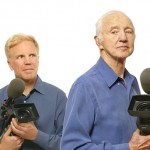Dir. by Mark S. Wexler
Tell Them Who You Are has the best opening scene of any film I saw at this year’s festival. Haskell Wexler is standing in his camera equipment room, taking stock of his inventory for an upcoming sale. When his son Mark, who is shooting the documentary that we are watching, asks his dad to explain where they are standing, Haskell shakes his head, twists his face with exasperation, and says (I’m paraphrasing from memory here): “No, Mark. You’re holding the fucking camera. Just shoot the room, and you’re audience will figure it out. If this is what your fucking movie is going to be like, if you’re planning to just shoot a bunch of talking heads, then the hell with it. I want nothing to do with it.”
It would be nearly impossible to make a dull documentary about Haskell Wexler. Now in his mid-80s, Wexler is as sharp and as full of piss as ever — still decrying injustice wherever he finds it, still ridiculing the mistakes of other filmmakers whenever he encounters them. Having shot nearly fifty features over the past five decades (including John Sayles’s Silver City, which also played at the festival), Wexler is justified in thinking himself an authority on the subject of filmmaking, which is why Tell Them Who You Are is such a fascinating movie. Being on the other side of the camera forces Wexler to revisit the aesthetic decisions that guided him through the making of his own documentaries forty years earlier, groundbreaking social films such as The Bus (1965), Medium Cool (1969), and Introduction to the Enemy (1974). He can barely tolerate his son’s direction at times, and that tension is at the heart of the film.
Mark Wexler is quite good with a camera himself, however, and his film is remarkably well-constructed. What begins as a standard Biography-style portrait, complete with childhood photos, juicy gossip, and celebrity testimonials, slowly evolves into, first, a self-reflexive commentary on the ethics of documentary filmmaking and, finally, a touching story of forgiveness and reconciliation. One of the final images is of Haskell sitting at a monitor, watching his son’s completed film. Mark doesn’t linger too long on the shot or allow it to become sentimental, but the emotion is evident on his father’s face and it speaks volumes. Mark seemed reticent to speak too candidly after the screening but did acknowledge that having a camera fixed between them offered both men a much-appreciated filter and that their relationship has, in many ways, been healed by the process.
I hope that Tell Them Who You Are finds decent distribution, and given the recent critical and popular success of so many documentaries, perhaps it will. It was one of my favorites of the festival, largely because of Haskell Wexler himself. His bottomless hatred of corporate interests and political conservatives (like his son) is inspiring and laugh-out-loud funny. But the film also exposes his pain and, though he would be loathe to admit it, his regret, particularly in a moving scene with his ex-wife, Mark’s mother. Another high recommendation.
